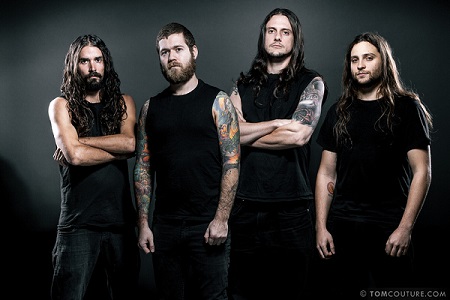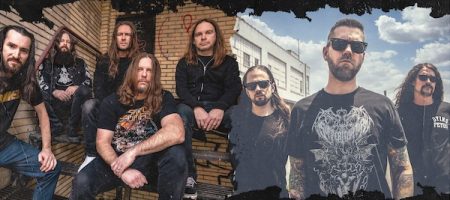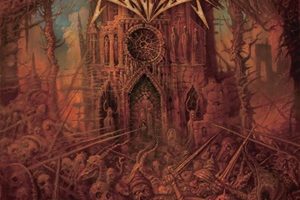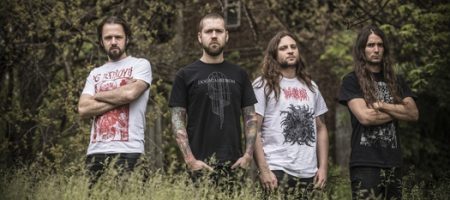Revocation – Disasterpieces and Thrashterpieces
Sunday, 4th August 2013
Possessing the rare combination of Berklee training and thrash knowledge, Boston’s Revocation have positioned themselves as one of the underground most buzzworthy – and formidable bands in the span of less than five years. Their 2009 album Existence is Futile can be considered the launch point for the band’s tech-thrash style, but it was 2011’s explosive Chaos of Forms and this year’s self-titled effort that should place David Davidson (awesome name) and crew in the upper echelons of the American metal underground.
Teeming with veritable riff gymnastics, as well as complex solos and visceral drum work, Revocation (the album) puts the listener to the test, yes, but it’s far less linear than one would imagine. Davidson’s scratchy vocals have a noted level of diction to them, while the accessible plunge of “Fracked” shows the band can lay off the gas when they want to, resulting in what could be their finest song to date. It’s a long way to come for Davidson and drummer Phil Dubois-Coyne from their halcyon Cryptic Warning days, a band as you’ll read below, helped become a training ground for their time in Revocation.
All this and more were on tap when we caught up with Davidson, who was prepping to head out on the 2013 installment of Summer Slaughter. Read on…
Dead Rhetoric: Doing a package tour like Summer Slaughter with such a diverse bill – how do you think you’ll fit in?
David Davidson: I think we should fit in pretty good. Our sound is pretty diverse as it is – we’re not just death metal and we’re not just thrash metal, we have a bunch of different influences. There’s something for everyone in general, but I think we can get the interest of many of the metalheads there.
Dead Rhetoric: Do you mind having to play a shorter set? I guess that’s part of the process when doing a big package tour like this.
Davidson: We have to play a shorter set anyway when we’re opening no matter [what]. If you’re first of four, or fourth of ten, you probably have the same set. The setlist isn’t as much of an issue. It’s logistics, like the load-in is much earlier because there’s so many bands, so that’s a pain in the ass and you’re dealing with ten bands worth of gear backstage as opposed to three. But, the venues are bigger and you have more space, so I’m looking forward to it. You get to play in front of huge crowds – this is why Summer Slaughter has become a brand. People come out to the shows just because of the name.
Dead Rhetoric: You’re slowly working your way up on some bills…
Davidson: We started off as opening packages, but we’ve gotten to the point now where depending on the band, we’ll be direct support. We’ve done headlining stuff now and obviously with a tour like Summer Slaughter with so many big names, but the fact we’re fourth, says something. It’s a tall ladder to climb, but we’ve been putting the work in and have been climbing up one rung at a time.
Dead Rhetoric: As for the new album, not like there weren’t expectations for Chaos of Forms, but for the new self-titled one, it seems like it’s on another level. Do you sense that as well?
Davidson: I never think about that when I’m writing. I just want to write songs that we like and hopefully everyone will come along for the ride. I think when you start thinking about how to please everyone and what people’s reactions will be, you drive yourself crazy. We write how we’ve always written. When we writing these songs, we were pretty stoked on them, so generally, when we go into it, and we think it’s our best material, the fans and critics will feel the same.
Dead Rhetoric: With a self-titled record you’ll be getting this question a lot: Naming your album as such generally means this is supposed to be your definitive work, so, is there any deeper reason?
Davidson: As a band, both internally and externally, we’re functioning better than we ever have. It’s a really cohesive unit. We’ve had a lot of change and we did get a new bass player, but I think this current incarnation is the strongest we’ve had of Revocation. I think it’s a no-brainer to name the album Revocation.
Dead Rhetoric: Vocally, I think you’re starting to hit your stride, like on “The Hive” or “Numbing Agents.” It makes me wonder if this was something you fell into, or if you ever wanted to be the singer in the band?
Davidson: My first band [Cryptic Warning], I was the singer and played guitar. When we went from that band to Revocation, we were going to get a singer, but we couldn’t find anyone, so I ended up staying on board. I fell into it; we couldn’t find anyone, so now it’s my role in the band to do that and play guitar. With every release, my vocals are developing. It’s a result of touring so much and screaming into the microphone every night – your vocals get more brutal over time. So yeah, I’m really pleased with my vocal performance on the newest one. It’s my favorite performance so far.
Dead Rhetoric: You don’t lose sight of being understandable, which is cool considering most singers think it’s okay to just belch anything into a microphone…
Davidson: Yeah, I think it’s good to be intelligible. There’s some more guttural stuff on the record, but in general, we take a long time writing the songs and I work hard writing the lyrics, so it’s cool people can figure out what the fuck I’m saying [laughs].
Dead Rhetoric: “Fracked” is one of the simpler songs on the album, but it’s one of the best. What’s the story behind it?
Davidson: It’s funny, “Fracked” almost didn’t make the record [laughs]. It’s like everyone’s favorite song and one of mine too. It’s one of those things where we were working on it, and the whole thing didn’t come together until we did the vocals. Certain songs, you can get a vibe right away, with “Fracked,” the whole thing came together with the solo and the bass tapping part and the vocals, it was more than the sum of its parts.
Almost every interview has brought up “Fracked,” which is cool. It’s more straightforward for us – the bridge section is in 5/4 and has some bass-tapping. It’s not the mainstream rock, radio song, but it showcases a different side of the band. It’s cool – it can’t be all blastbeats and double-bass. Lyrically, it’s about hydraulic fracturing, the controversial process to extract natural gas. It’s a hot topic of debate in our country right now, and if you read the lyrics, I think it’s obvious what side I’m on.
Dead Rhetoric: Have you seen the Gasland documentary?
Davidson: Yeah! Seeing that movie is what inspired me to write it. There’s a sequel, Gasland II, I don’t know if it’s out yet, but the filmmaker said he’s putting it out soon.
Dead Rhetoric: Given your musical background and training, do you find it hard to bridge the gap between being technical and having stuff that’s easy to play and a bit more digestible?
Davidson: You know, we try to use technicality as an ingredient, not the entire dish. It’s something that’s there, it’s a part of our musical vernacular. The be-all, end-all goal isn’t to be technical. If that’s your goal and only your goal, you lost sight of the songwriting process, which is the most important part. We try to focus first and foremost on the song. If we come up with a crazy riff and it might be awesome, but if it doesn’t fit with the tempo or vibe of the song, it might be saved for another day.
Dead Rhetoric: Does the fact you know so much about theory get in the way of a cool idea? Like, if something sounds good, but it goes against your musical theory, you can’t use it?
Davidson: Not really. I try not think about that stuff too much. I think more about it when writing a solo, like, what key am I in, or what scale to use. There’s ways around that. All the options are available. I went to Berklee and the first thing they tell you when you graduate is to forget everything you learned when writing music.
Dead Rhetoric: The Cryptic Warning days, how do you view them now?
Davidson: It was funny. We were kids back then and didn’t know anything. We never made t-shirts or anything [laughs]. It was a good first try. We made our mistakes and learned from them and then decided to start over and take what we learned from Cryptic Warning and do it better. It was a necessary thing. We’ll call it a “run-through.”




























